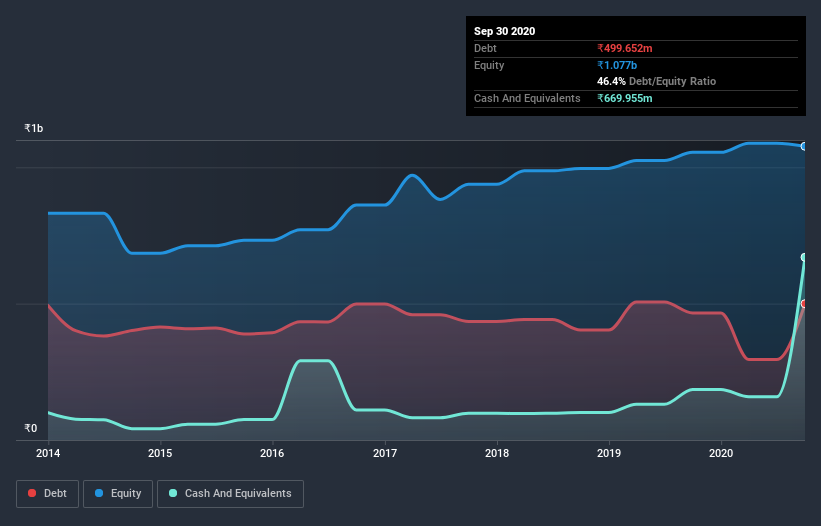These 4 Measures Indicate That Tera Software (NSE:TERASOFT) Is Using Debt Reasonably Well

Some say volatility, rather than debt, is the best way to think about risk as an investor, but Warren Buffett famously said that 'Volatility is far from synonymous with risk.' So it seems the smart money knows that debt - which is usually involved in bankruptcies - is a very important factor, when you assess how risky a company is. Importantly, Tera Software Limited (NSE:TERASOFT) does carry debt. But should shareholders be worried about its use of debt?
What Risk Does Debt Bring?
Generally speaking, debt only becomes a real problem when a company can't easily pay it off, either by raising capital or with its own cash flow. In the worst case scenario, a company can go bankrupt if it cannot pay its creditors. While that is not too common, we often do see indebted companies permanently diluting shareholders because lenders force them to raise capital at a distressed price. Of course, the upside of debt is that it often represents cheap capital, especially when it replaces dilution in a company with the ability to reinvest at high rates of return. When we examine debt levels, we first consider both cash and debt levels, together.
View our latest analysis for Tera Software
What Is Tera Software's Net Debt?
You can click the graphic below for the historical numbers, but it shows that as of September 2020 Tera Software had ₹499.7m of debt, an increase on ₹465.5m, over one year. However, its balance sheet shows it holds ₹670.0m in cash, so it actually has ₹170.3m net cash.

A Look At Tera Software's Liabilities
According to the last reported balance sheet, Tera Software had liabilities of ₹1.82b due within 12 months, and liabilities of ₹34.3m due beyond 12 months. Offsetting these obligations, it had cash of ₹670.0m as well as receivables valued at ₹1.61b due within 12 months. So it can boast ₹425.3m more liquid assets than total liabilities.
This luscious liquidity implies that Tera Software's balance sheet is sturdy like a giant sequoia tree. Having regard to this fact, we think its balance sheet is just as strong as misogynists are weak. Succinctly put, Tera Software boasts net cash, so it's fair to say it does not have a heavy debt load!
Shareholders should be aware that Tera Software's EBIT was down 35% last year. If that earnings trend continues then paying off its debt will be about as easy as herding cats on to a roller coaster. When analysing debt levels, the balance sheet is the obvious place to start. But it is Tera Software's earnings that will influence how the balance sheet holds up in the future. So when considering debt, it's definitely worth looking at the earnings trend. Click here for an interactive snapshot.
But our final consideration is also important, because a company cannot pay debt with paper profits; it needs cold hard cash. While Tera Software has net cash on its balance sheet, it's still worth taking a look at its ability to convert earnings before interest and tax (EBIT) to free cash flow, to help us understand how quickly it is building (or eroding) that cash balance. Over the last three years, Tera Software saw substantial negative free cash flow, in total. While that may be a result of expenditure for growth, it does make the debt far more risky.
Summing up
While we empathize with investors who find debt concerning, you should keep in mind that Tera Software has net cash of ₹170.3m, as well as more liquid assets than liabilities. So we don't have any problem with Tera Software's use of debt. There's no doubt that we learn most about debt from the balance sheet. However, not all investment risk resides within the balance sheet - far from it. Take risks, for example - Tera Software has 5 warning signs (and 3 which are potentially serious) we think you should know about.
If, after all that, you're more interested in a fast growing company with a rock-solid balance sheet, then check out our list of net cash growth stocks without delay.
If you decide to trade Tera Software, use the lowest-cost* platform that is rated #1 Overall by Barron’s, Interactive Brokers. Trade stocks, options, futures, forex, bonds and funds on 135 markets, all from a single integrated account. Promoted
Valuation is complex, but we're here to simplify it.
Discover if Tera Software might be undervalued or overvalued with our detailed analysis, featuring fair value estimates, potential risks, dividends, insider trades, and its financial condition.
Access Free AnalysisThis article by Simply Wall St is general in nature. It does not constitute a recommendation to buy or sell any stock, and does not take account of your objectives, or your financial situation. We aim to bring you long-term focused analysis driven by fundamental data. Note that our analysis may not factor in the latest price-sensitive company announcements or qualitative material. Simply Wall St has no position in any stocks mentioned.
*Interactive Brokers Rated Lowest Cost Broker by StockBrokers.com Annual Online Review 2020
Have feedback on this article? Concerned about the content? Get in touch with us directly. Alternatively, email editorial-team@simplywallst.com.
About NSEI:TERASOFT
Tera Software
Provides IT and integrated related products and services worldwide.
Solid track record with excellent balance sheet.


